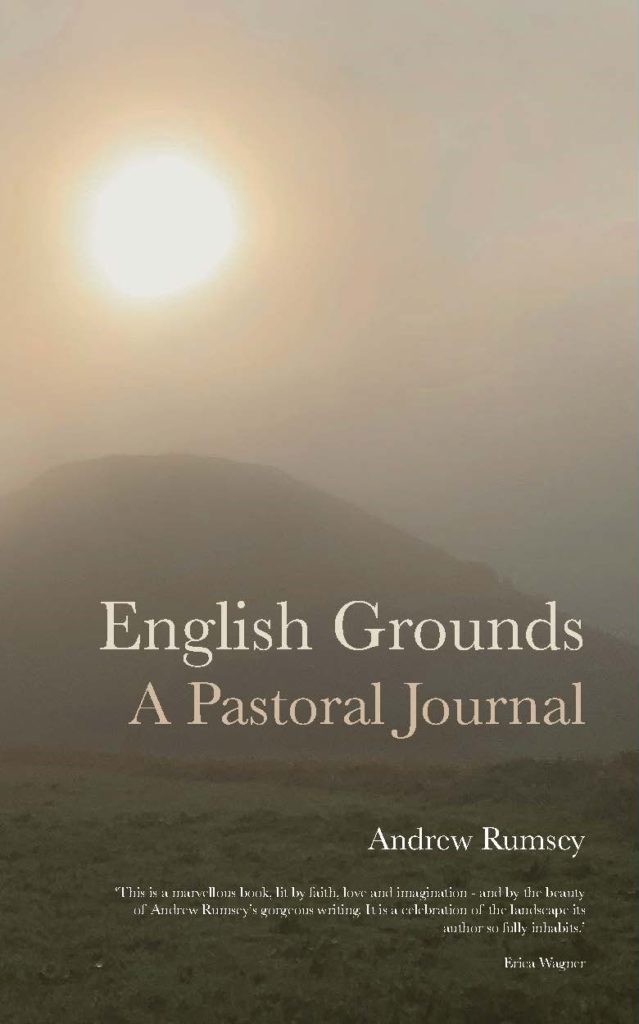Mark Brend dips into Andrew Rumsey’s ‘English Grounds: A Pastoral Journal’, finding its author, the Bishop of Ramsbury, much like an Anglican Julian Cope.

Some books are more than they purport to be — for example, Jennifer Lucy Allan’s The Foghorn’s Lament and Ian Helliwell’s Tape Leaders, both published in 2021. Each an erudite exploration of its subject (the history of foghorns and early British electronic music respectively), they are also like covert autobiographies. When you’ve finished reading you know a lot more about foghorns and early British electronic music. You also learn something about the authors, through the lenses of their enthusiasms.
Andrew Rumsey’s English Grounds: A Pastoral Journey pulls off a similar trick, though from a different starting point. Compared to Allan and Helliwell, his subject is not so clearly delineated. In his introduction, Rumsey — a singer-songwriter, a poet and a Church of England clergyman — tells us that the book was conceived in a time of personal transition. In 2019, after many years in or near London, he moved to Wiltshire, the newly ordained Bishop of Ramsbury. Once there, he began exploring his surrounds in the course of his duties and in a series of early morning lockdown walks. These miniature peregrinations he documents in a series of short essays, in which he reflects on place, faith and England. ‘This book is, then’ he says, ‘partly a hymn from Wiltshire’. Partly is the word to note there. Rumsey sometimes ventures beyond county boundaries — to Northern Ireland or Wales, for example. And a pleasing tension in English Grounds is that, for all its concern with locality, Rumsey’s imagination roams unbounded around his extensive hinterland. This, then, is also a book about history, nature, church architecture, rivers, family and culture. And more. In fact, as you read you suspect that, when presenting his elevator pitch to his publisher, SCM Press, Rumsey bent forward a little and with a conspiritorial wink, said: “come on, just let me ruminate about anything that interests me”.
In the hands of a lesser writer such an approach could be problematic. Happily, Rumsey makes it work. By tying each set of musings to a journey and a place he corrals his eclectic tendencies and creates a coherent episodic narrative. Particularly affecting are the few times he talks directly of his father and grandfather, both clergymen, of family holidays, of children growing up. His poet’s prose is rich in metaphor, allusion and the carefully turned phrase. It is, too, shot through with mordant, self-deprecating humour and flashes of visionary insight. You finish knowing that Rumsey has convictions and opinions, but these are offered gently, often as questions. The hectoring, dogmatic tone that blights some faith writing is entirely absent.
Sometimes Rumsey comes across as a 21st century equivalent of the parson polymaths of the Victorian age. Like a distant relative of priest, antiquarian, hymn writer, novelist and folk song collector Sabine Baring-Gould. At other times he is more like a Dorothy L Sayers or a TS Eliot. Christian intellectuals and artists at the heart of their culture.
It’s hard to think of many other writers these days in either of those categories. So vivid is Rumsey’s voice in English Grounds, though, that it’s not at all hard to imagine running into him one Wiltshire morning. When he first strikes up conversation, you wonder what you’re letting yourself in for. But soon you’re swept up into a discursive ramble that might take in the reintroduction of Great Bustards on Salisbury Plain, John Lydon, Avebury, the Diggers, and how the warring brotherhood at the heart of the Kinks is, somehow, a little like the Wiltshire Air Ambulance helicopter. George Herbert, the Virgin Mary, William Blake and long-ago divines unknown to most of us rub shoulders with Michel Foucault, Eleanor Bron, Richard Jefferies and Mother Shipton (of caves fame). You take your leave of him feeling enlarged, and it comes to you that he is something like an Anglican Julian Cope. You hope you’ll run into him again.
Hats off to SCM Press for allowing Rumsey room to roam. A book by a bishop on place, faith and England might have been a decent read. This genre-evading book is much more than that, and all the better for it.
*
‘English Grounds’ is out now and available here (£19.99). Read an extract from the book here.
Mark Brend is a writer of fiction. He also writes about and makes music. Follow him on Twitter / visit his website.